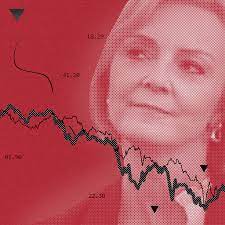(The New York Times, 19.Oct.2022) — The world has just witnessed one of the most extraordinary political immolations of recent times. Animated by faith in a fantasy version of the free market, Prime Minister Liz Truss of Britain set off a sequence of events that has forced her to fire her chancellor of the Exchequer, Kwasi Kwarteng, and led her to the brink of being ousted by her own party.
Just over three weeks ago, a “mini budget” offering some 45 billion pounds in corporate, income and payroll tax cuts focusing on the wealthy, alongside 60 billion pounds in energy spending support, was announced. This was the biggest fiscal package in decades, but it was not reviewed by the requisite fiscal authorities, nor did Ms. Truss hold a public mandate through a general election, having been selected by Tory members as leader to replace Boris Johnson. The response to the “fiscal event” was immediate, driving the world economy to its most critical point since the Covid crash of early 2020.
The British pound dropped to its lowest value against the dollar, and the Bank of England had to intervene to save contagion from spreading into the pension system and beyond. The stakes of the crisis were global size. Strangest of all, this was done purposefully, in a reckless act of deliberate policy, better thought of as a gesture of political conviction.
There’s something tragicomic, if not tragic, about capitalist revolutionaries Ms. Truss and Mr. Kwarteng laid low by the mechanisms of capitalism itself. Ms. Truss and Mr. Kwarteng may be the last of the Thatcherites, defeated by the very system they believed they were acting in fidelity to.
The cultivation of the ideology that would become known as Thatcherism began in the 1970s. Defined early as the belief in “the free economy and the strong state,” Thatcherism condemned the postwar British welfare economy and sought to replace it with virtues of individual enterprise and religious morality.
Over the subsequent four decades, Thatcherites at think tanks like the Institute of Economic Affairs and the Centre for Policy Studies (which Margaret Thatcher helped set up) described the struggle against both the Labour Party and the broader persistence of socialism in the Communist and non-Communist world as a war of ideas.
The breakthrough in the war of ideas happened in 1979 with Thatcher’s election, followed by that of Ronald Reagan the year after. The ideas produced by think tanks — from privatization to union breaking — had a springtime of application in the 1980s, but Thatcherism was never realized wholesale, and it remained rived by contradictions. Many of Thatcher’s true believers attributed the derailing of her project to the rise of the European Union, which in their view tangled the homeland of classical liberalism in the red tape of European law.
Losing the leadership in 1990, Thatcher continued to grumble from the backbenches, growing increasingly hostile to the European Union and finding comfort with a surly group of Tory hard-liners. These Thatcherites, known collectively as the ultras, gained fresh blood in the 2010s as a group of Gen Xers too young to experience Thatcherism in its insurgent early years — including the former home secretary Priti Patel, the former foreign secretary Dominic Raab, the former minister of state for universities Chris Skidmore, Mr. Kwarteng and Ms. Truss — attempted to reboot her ideology for the new millennium.
They followed their idol not only in her antagonism to organized labor but also in her less-known fascination with Asian capitalism. In 2012’s “Britannia Unchained,” a book co-written by the group that remains a Rosetta Stone for the policy surprises of the last month, they slammed the Britons for their eroded work ethic and “culture of excuses” and the “cosseted” public sector unions. They praised China, South Korea, Singapore and Hong Kong. “The average Singaporean works two hours and 20 minutes a day longer than the average Brit,” they observed — as if longer working days were something to aspire to. “Britannia Unchained” expressed a desire to go back to the future by restoring Victorian values of hard work, self-improvement and bootstrapping.
While the Gen X Thatcherites didn’t scrimp on data, they also saw something ineffable at the root of British malaise. “Beyond the statistics and economic theories,” they wrote, “there remains a sense in which many of Britain’s problems lie in the sphere of cultural values and mind-set.” As Thatcher herself put it, “Economics are the method; the object is to change the heart and soul.” Britain needed a leap of faith to restore itself.
In a passage much repeated in the hallways of think tanks, the British Austrian economist Friedrich Hayek said in 1949 that a necessary weapon in the arsenal of the war of ideas was “a liberal Utopia.”
The mini-budget that ended Mr. Kwarteng’s tenure as chancellor of the Exchequer and crashed the pound can be seen as a utopian gesture, an act of voluntarism designed to jolt the British people out of their post-pandemic torpor through its very boldness. Ms. Truss and Mr. Kwarteng seemed to have believed that by patching together all of the most radical policies of Thatcherism (while conveniently dropping the need for spending cuts), they would be incanting a kind of magic spell, an “Open sesame” for “global Britain.” This was their Reagan moment, their moment when, as their favorite metaphors put it, a primordial repressed force would be “unchained,” “unleashed” or “unshackled.”
But as a leap of faith, it broke the diver’s neck.
The outcome resulted in a divergence between the incentives of existing capitalism and the fairy tale of liberal utopia. Just as Brexiteers had discovered after the departure of the country from the European Union that the City of London actually didn’t want to be freed of the regulations that they were promising, the money markets were not waiting for an act of faith in Laffer Curve fundamentalism after all. This was “Reaganism without the dollar.” Without the confidence afforded to the global reserve currency, the pound went into free fall.
Since the 1970s, the world of think tanks had embraced a framing of the world in terms of discrete spaces that could become what they called laboratories for new policies. The mini-budget subjected the entire economy to experimental treatment. This was put in explicit terms in a celebratory post by a Tory journalist and think tanker claiming that Ms. Truss and Mr. Kwarteng had been “incubated” by the Institute of Economic Affairs in their early years and “Britain is now their laboratory.”
The framing captures the situation well. The scientists at the bench discovered that the money markets would not only punish left-wing experiments in changing the balance between states and markets, but they were also sensitive to experiments that pushed too far to the right. A cowed Ms. Truss apologized, and Mr. Kwarteng’s successor has reversed almost all of the planned cuts and limited the term for energy supports.
Whether Thatcherism itself is dead is too soon to judge. Political religions have long afterlives.
____________________



